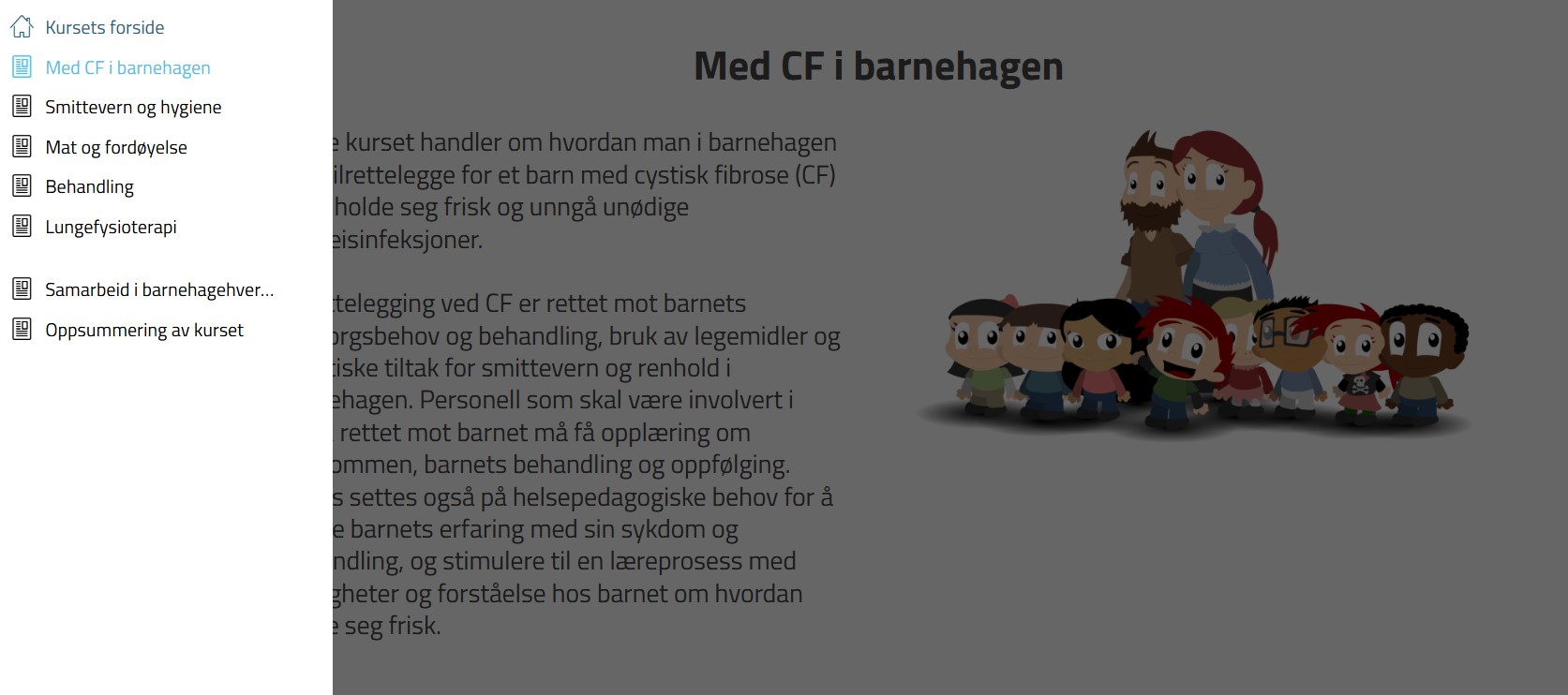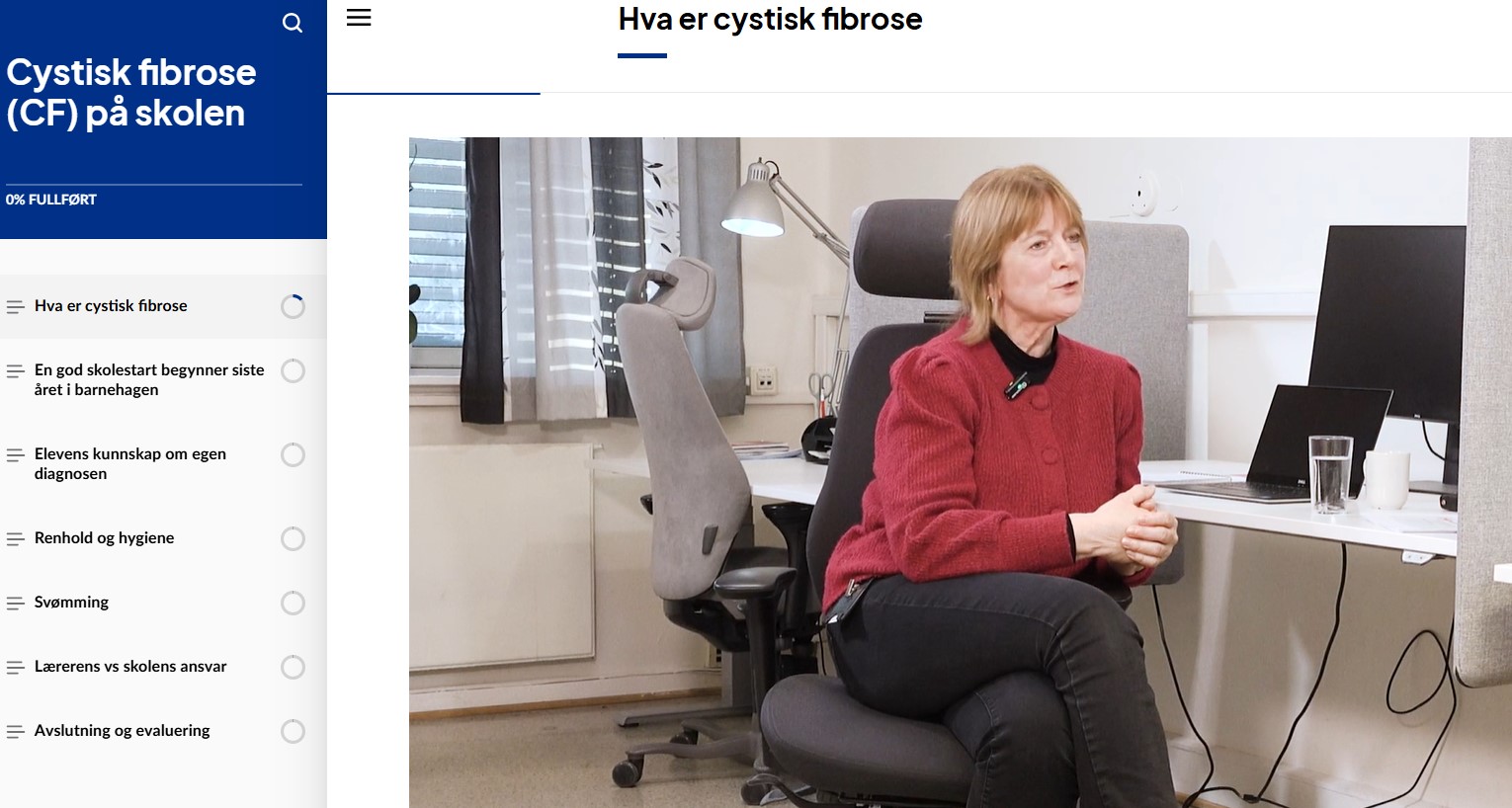Children with cystic fibrosis
Every child is unique, and this applies to children with cystic fibrosis (CF) as well, both in their personalities and in their experiences with the disease. While all children explore and develop, those with CF have additional considerations to manage.
This requires personalized care tailored to each child's specific needs and the progression of their illness. As children grow, their condition and needs will evolve, and managing CF will demand more from everyone involved, particularly the child themselves. It’s important to be prepared for changing challenges and to adjust care and treatment accordingly to support the child through these transitions.

Et barneliv med cystisk fibrose
I videoen under kan du se perspektivet til danske Asta på 6 år år hun forteller om sin hverdag med sykdommen.
The Early Years with CF
This section provides valuable information on various aspects of living with cystic fibrosis (CF) during the early years. We cover important topics such as navigating early childhood, starting school, creating individual care plans (IP), and working with support teams. These elements are crucial for ensuring that children with CF and their families can manage daily life effectively.
Starting kindergarten with cystic fibrosis
Cystisk fibrose-kompetent helsepersonell anbefaler å utsette barnehagestarten til barnet har fylt to år. Utsettelsen gir tid for etablering av individuell behandling, også familien tid til å tilpasse seg hverdagen med en sykdom som krever planlegging og tilrettelegging.
Starting kindergarten should be carefully planned with input from parents, kindergarten staff, and relevant healthcare professionals. It's best to start this process early, ideally about a year in advance. Since cystic fibrosis is a rare disease, kindergarten staff will need specialized training on how it affects the child. The focus should be on the child's specific needs for infection control, cleanliness, and treatment while encouraging them to develop skills and an understanding of their condition.
Parents who have experience with CF, together with healthcare professionals, should provide guidance and training to the kindergarten staff and other municipal employees involved in the child’s care. Ensuring thorough cleaning of areas, toys, and other items is crucial and may require additional resources. The child’s needs for special accommodations often lead to requests for extra support, such as medication during meals, antibiotic treatments, and training in hygiene practices. Other considerations might include transportation to and from physical therapy for lung treatments during kindergarten hours.
When it comes to informing other parents about the child’s condition, most choose to share the information positively. Some prefer to handle this themselves, while others involve staff or healthcare professionals. Written materials can also be helpful.
For staff in elementary schools and after-school programs, the online course "Cystic Fibrosis in Kindergarten" available at www.sjelden.no and is recommended as essential training for kindergarten staff.
Starting school with cystic fibrosis
Transitioning from kindergarten to school requires thorough planning and should ideally begin in the fall before school starts. Insights from kindergarten about accommodations can be invaluable for the school as they prepare to welcome a student with cystic fibrosis (CF). The need for additional resources is assessed by the school in consultation with parents and healthcare providers, and an application for these resources is required.
The structured nature of the school day means that accommodations can be crucial for ensuring a smooth daily routine. Many families choose to schedule lung treatments with a physiotherapist during after-school care to minimize disruption to classroom time.
Planning for school includes many of the same considerations as for kindergarten, such as understanding CF, ensuring proper cleanliness and hygiene, and making adjustments to facilities like toilets, exercise areas, showers, and changing rooms.
Students needing special accommodations often have an Individual Education Plan (IEP) developed to ensure they receive the appropriate support.
As children enter school, their classmates may be curious and want to learn more about CF. The book "Sånn er det" by Widar Aspeli offers a helpful introduction to living with CF and what the disease involves. You can contact the Norwegian Cystic Fibrosis Center to obtain a copy.
Some children may choose to explain their condition to their classmates themselves, while others might prefer that parents, teachers, or healthcare professionals handle this. The approach can vary—each family and individual with CF should decide what works best for their situation.
Nettkurset «Cystisk fibrose på skolen» er tilgjengelig på www.sjelden.no is recommended as foundational training.


Individual Plan (IP)
Managing cystic fibrosis (CF) involves a lot of learning, and many people may feel frustrated or uncertain about their rights and the available support. Individuals with CF often need coordination between multiple services over an extended period. Therefore, creating an Individual Plan (IP) with the local municipality can be extremely helpful. While an IP is not mandatory, you are entitled to request one if desired.
The IP is designed to outline all the needs of the child and their family, and to clarify goals and responsibilities.
Developing an IP can reduce some of the burdens on parents or guardians, and it should always be created in collaboration with them. As children get older, many will want to be actively involved in the planning process.
Responsibility Group
To ensure effective interdisciplinary collaboration and coordinated services as outlined in the IP, a responsibility group should be formed. This group includes those closest to the child, such as parents or guardians, healthcare providers, representatives from the child’s kindergarten or school (teachers, after-school assistants, school nurses), the general practitioner, and other relevant individuals.
A coordinator should be appointed within the group to oversee progress and coordinate actions. The frequency and format of meetings can vary, but it is often beneficial to meet before major changes, such as starting school or adjusting treatment plans, to ensure effective planning and adjustments.
NAV and Helfo
NAV (the Norwegian Labour and Welfare Administration) and Helfo (the Health Economics Administration) are important agencies that can assist individuals with cystic fibrosis (CF) and their families in various ways. They provide support with:
- Travel expenses
- Medication costs
- Assistive devices
- Basic and supplementary benefits
- Education and care allowances
- Caregiver wages
- Respite care and support services
Jungelhåndboka
Jungelhåndboka is published annually by the Norwegian Organization for Disabled People (FFO) and serves as an updated guide offering in-depth information on laws and rights within welfare law. This book is an invaluable reference, thoroughly detailing all relevant support schemes. It provides a comprehensive overview that is especially useful for individuals with cystic fibrosis (CF) and others living with disabilities. We highly recommend Jungelhåndboka as a resource for navigating the complex landscape of support programs and rights.


Support us
We are grateful for all
contributions to our work.
Support us
We are grateful for all
contributions to our work.

